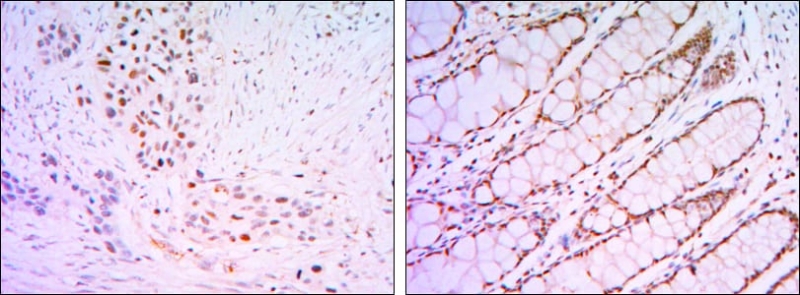
| WB | 咨询技术 | Human,Mouse,Rat |
| IF | 咨询技术 | Human,Mouse,Rat |
| IHC | 1/200 - 1/1000 | Human,Mouse,Rat |
| ICC | 技术咨询 | Human,Mouse,Rat |
| FCM | 咨询技术 | Human,Mouse,Rat |
| Elisa | 1/10000 | Human,Mouse,Rat |
| Aliases | EZF; GKLF; KLF4 |
| Entrez GeneID | 9314 |
| clone | 1E5 |
| WB Predicted band size | 55kDa |
| Host/Isotype | Mouse IgG1 |
| Antibody Type | Primary antibody |
| Storage | Store at 4°C short term. Aliquot and store at -20°C long term. Avoid freeze/thaw cycles. |
| Species Reactivity | Human |
| Immunogen | Purified recombinant fragment of human KLF4 (AA: 2-470) expressed in E. Coli. |
| Formulation | Ascitic fluid containing 0.03% sodium azide. |
+ +
以下是关于KLF4抗体的3篇代表性文献摘要(已简化整理):
---
1. **文献名称**: *Induction of Pluripotent Stem Cells from Mouse Embryonic and Adult Fibroblast Cultures by Defined Factors*
**作者**: Takahashi K, Yamanaka S.
**摘要**: 该研究首次报道了通过转录因子(包括KLF4)重编程体细胞为多能干细胞。文中使用KLF4抗体通过免疫荧光和Western blot验证了KLF4蛋白在重编程过程中的表达,证实其在维持干细胞多能性中的关键作用。
2. **文献名称**: *Gut-enriched Krüppel-like factor (KLF4) suppresses intestinal cell proliferation and alters cell fate*
**作者**: Katz JP, Perreault N, et al.
**摘要**: 研究通过KLF4抗体染色发现,KLF4在小肠上皮细胞分化中高表达,并通过抑制细胞周期蛋白调控增殖。实验表明KLF4缺失导致肠道干细胞异常增殖,提示其作为肿瘤抑制因子的潜在功能。
3. **文献名称**: *Role of KLF4 in breast cancer progression and drug resistance*
**作者**: Yu F, Li J, et al.
**摘要**: 该研究利用KLF4抗体进行免疫组化分析,发现乳腺癌组织中KLF4表达水平与患者预后负相关。机制研究表明,KLF4通过调控EMT(上皮-间质转化)相关基因增强癌细胞侵袭性,并影响化疗敏感性。
---
**注**:以上文献均发表于高影响力期刊(如Cell、Development、Oncogene),具体年份和卷期需根据实际引用补充。建议通过PubMed或Google Scholar搜索标题获取完整信息。
The Krüppel-like factor 4 (KLF4) antibody is a key tool for studying the KLF4 protein, a transcription factor belonging to the Krüppel-like family of zinc finger proteins. KLF4 regulates diverse cellular processes, including cell cycle progression, pluripotency, differentiation, and somatic cell reprogramming. It is highly expressed in embryonic stem cells and plays a critical role in maintaining pluripotency alongside OCT4. SOX2. and c-MYC. KLF4 also exhibits context-dependent roles in cancer, acting as either a tumor suppressor or oncogene depending on tissue type and cellular environment.
KLF4 antibodies are widely used in research to detect and quantify KLF4 expression in various applications, such as Western blotting, immunohistochemistry (IHC), immunofluorescence (IF), and flow cytometry. These antibodies help investigate KLF4's involvement in development, tissue homeostasis, and disease mechanisms. Specific monoclonal or polyclonal antibodies are validated for target specificity, often using knockout cell lines or siRNA-mediated knockdown controls. Researchers rely on KLF4 antibodies to explore its regulatory networks in stem cell biology, cancer progression, and cellular reprogramming, making them essential for advancing studies in regenerative medicine and oncology. Quality validation, including cross-reactivity checks and functional assays, ensures reliable experimental outcomes.
×